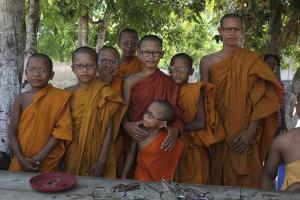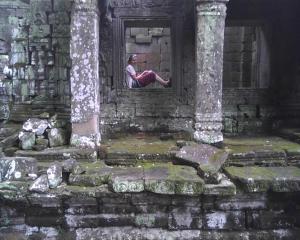Marlboro Returns to Cambodia

Last May, Marlboro community members took part in the second service-learning trip to Cambodia in the past three years, building on relationships from the last visit and forging new ones. For two weeks, art faculty John Willis and Cathy Osman as well as Max Foldeak, director of health services, were joined by seven students as they visited communities, participated in ESL classes in local schools and helped with water projects.
“Going to Cambodia completely changed the way I look at the world, and specifically the way I look at America,” said senior Nick Rouke. “It was the first time I had left the country, and it was incredibly difficult. It made me realize what I take for granted.”
Before their trip, the group initiated a community-wide auction of paintings, prints, photos, books, ceramics and other artwork created by students and faculty to raise $2,500 in aid for organizations in Cambodia. They also brought children’s books, medications and medical equipment, including nearly a thousand pairs of eyeglasses, donated from many local sources, as well as 30 laptop computers donated by Pfizer, Inc. Donations were processed through the World Peace Fund and the Amherst/Cambodia Water project. In-kind donations were brought by the group directly to schools in Kampong Chhnang, Ang, Pursat, Omani, Siem Reap and other communities where they participated in service projects.

In addition to their work in communities, the group from Marlboro visited the capital of Phnom Penh, the temples at Angkor and memorials to those killed during the Khmer Rouge period.
“We visited Tuol Sleng, a school that Pol Pot converted into a prison where he tortured and killed people,” said Nick, who had previously studied captivity and totalitarian regimes in other contexts. “People would be killed for disagreeing, much like the purges during the Stalinist era. It was very difficult to be there, but it made me really think about the things I have studied during my time here at Marlboro, why they are important to me, and what I want to do about it.”
